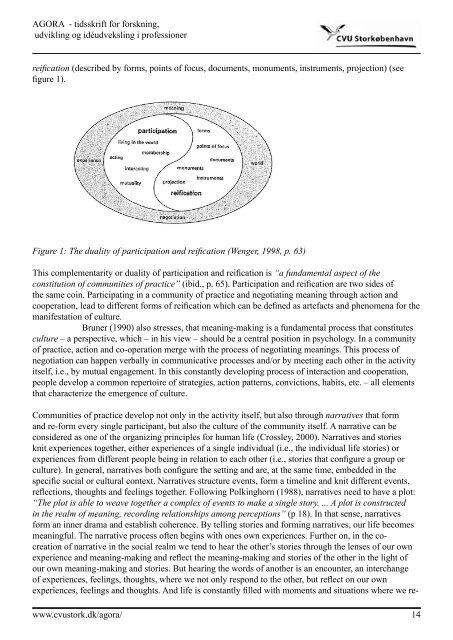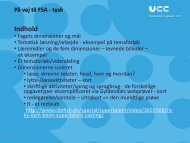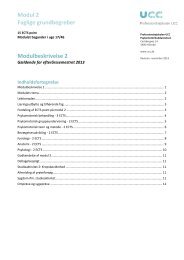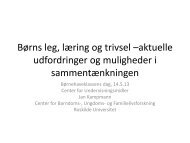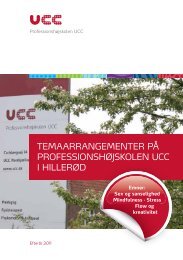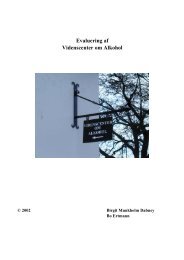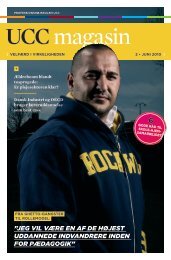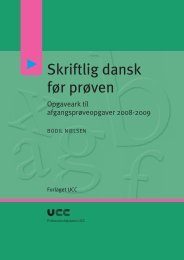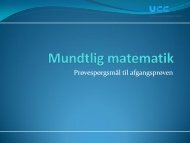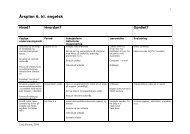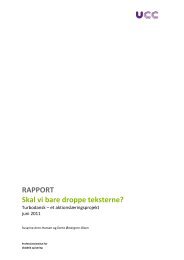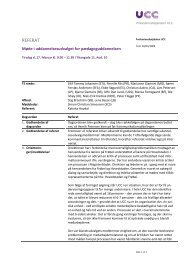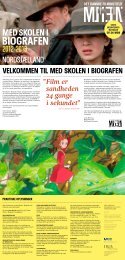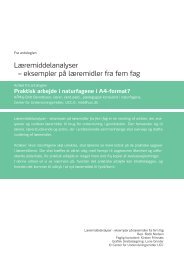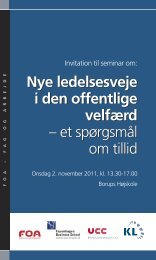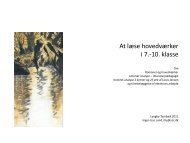AGORA - tidsskrift for forskning, udvikling og idéudveksling i ...
AGORA - tidsskrift for forskning, udvikling og idéudveksling i ...
AGORA - tidsskrift for forskning, udvikling og idéudveksling i ...
Create successful ePaper yourself
Turn your PDF publications into a flip-book with our unique Google optimized e-Paper software.
<strong>AGORA</strong> - <strong>tidsskrift</strong> <strong>for</strong> <strong>for</strong>skning,<br />
<strong>udvikling</strong> <strong>og</strong> <strong>idéudveksling</strong> i professioner<br />
reification (described by <strong>for</strong>ms, points of focus, documents, monuments, instruments, projection) (see<br />
figure 1).<br />
Figure 1: The duality of participation and reification (Wenger, 1998, p. 63)<br />
This complementarity or duality of participation and reification is “a fundamental aspect of the<br />
constitution of communities of practice” (ibid., p. 65). Participation and reification are two sides of<br />
the same coin. Participating in a community of practice and negotiating meaning through action and<br />
cooperation, lead to different <strong>for</strong>ms of reification which can be defined as artefacts and phenomena <strong>for</strong> the<br />
manifestation of culture.<br />
Bruner (1990) also stresses, that meaning-making is a fundamental process that constitutes<br />
culture – a perspective, which – in his view – should be a central position in psychol<strong>og</strong>y. In a community<br />
of practice, action and co-operation merge with the process of negotiating meanings. This process of<br />
negotiation can happen verbally in communicative processes and/or by meeting each other in the activity<br />
itself, i.e., by mutual engagement. In this constantly developing process of interaction and cooperation,<br />
people develop a common repertoire of strategies, action patterns, convictions, habits, etc. – all elements<br />
that characterize the emergence of culture.<br />
Communities of practice develop not only in the activity itself, but also through narratives that <strong>for</strong>m<br />
and re-<strong>for</strong>m every single participant, but also the culture of the community itself. A narrative can be<br />
considered as one of the organizing principles <strong>for</strong> human life (Crossley, 2000). Narratives and stories<br />
knit experiences t<strong>og</strong>ether, either experiences of a single individual (i.e., the individual life stories) or<br />
experiences from different people being in relation to each other (i.e., stories that configure a group or<br />
culture). In general, narratives both configure the setting and are, at the same time, embedded in the<br />
specific social or cultural context. Narratives structure events, <strong>for</strong>m a timeline and knit different events,<br />
reflections, thoughts and feelings t<strong>og</strong>ether. Following Polkinghorn (1988), narratives need to have a plot:<br />
“The plot is able to weave t<strong>og</strong>ether a complex of events to make a single story. ... A plot is constructed<br />
in the realm of meaning, recording relationships among perceptions” (p 18). In that sense, narratives<br />
<strong>for</strong>m an inner drama and establish coherence. By telling stories and <strong>for</strong>ming narratives, our life becomes<br />
meaningful. The narrative process often begins with ones own experiences. Further on, in the cocreation<br />
of narrative in the social realm we tend to hear the other’s stories through the lenses of our own<br />
experience and meaning-making and reflect the meaning-making and stories of the other in the light of<br />
our own meaning-making and stories. But hearing the words of another is an encounter, an interchange<br />
of experiences, feelings, thoughts, where we not only respond to the other, but reflect on our own<br />
experiences, feelings and thoughts. And life is constantly filled with moments and situations where we re-<br />
www.cvustork.dk/agora/ 14


